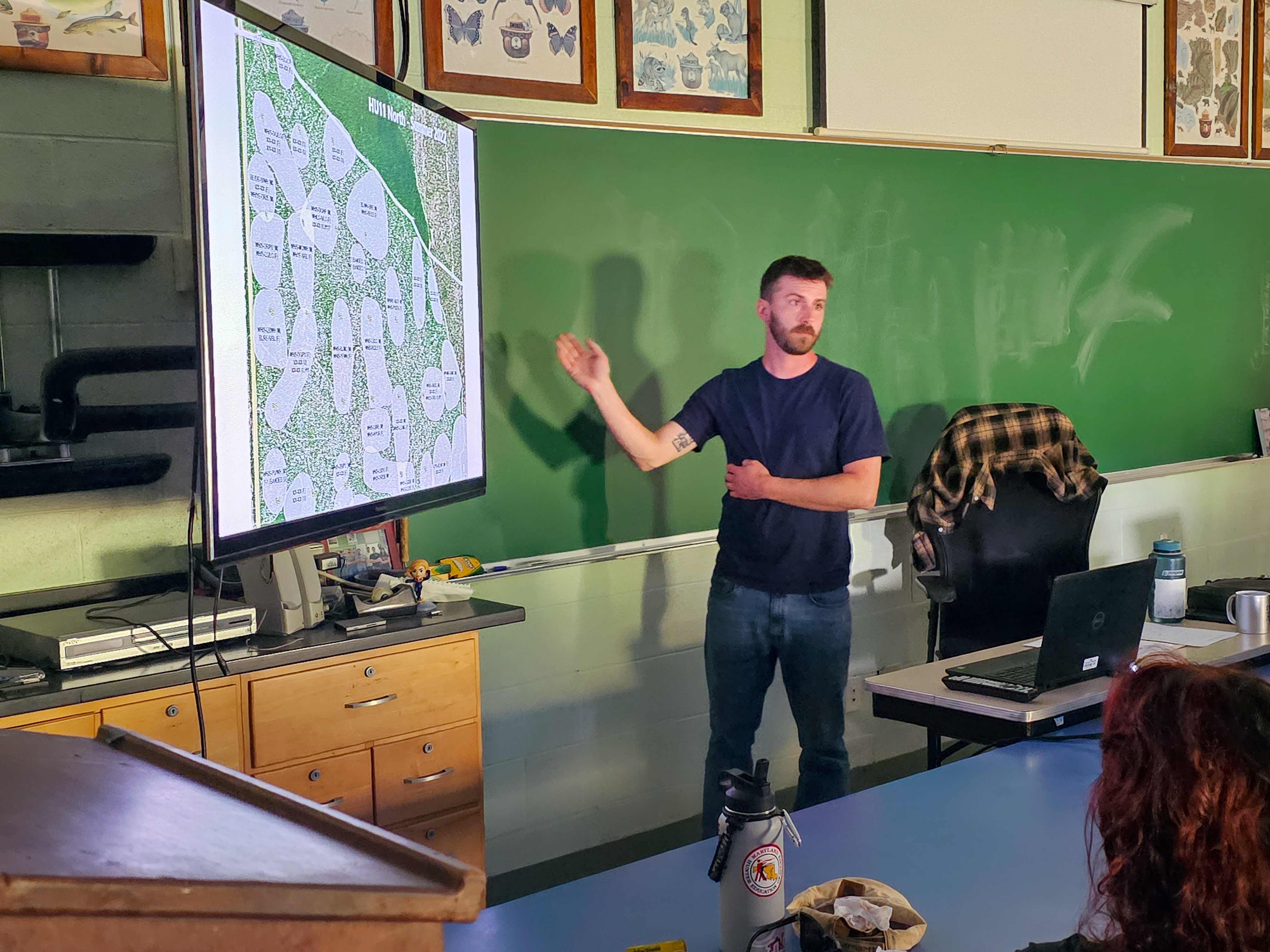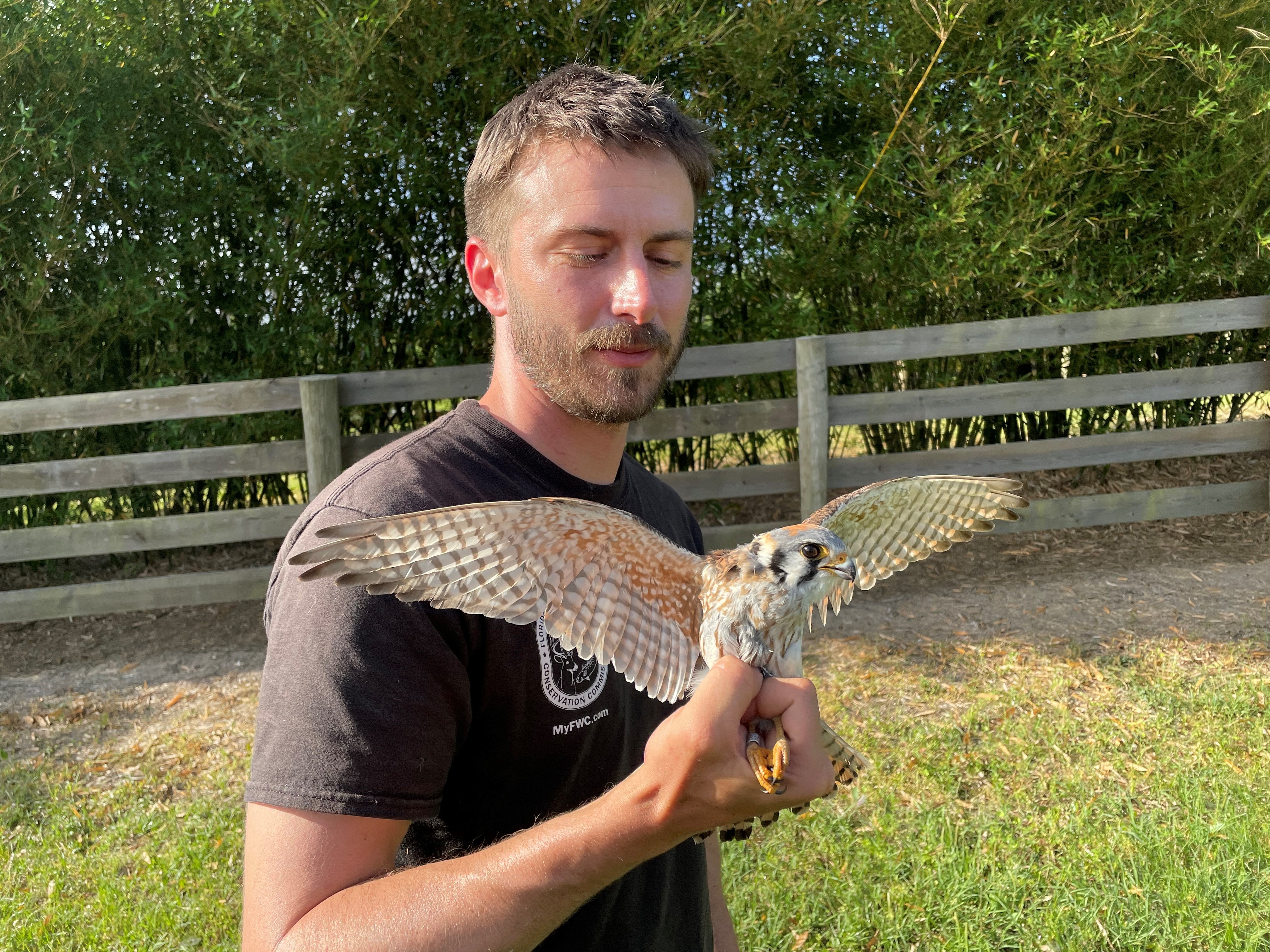Campus News
Octobr 10th, 2023
Mulligan turns avian interests into career
Garrett College NRWT graduate is now avian biologist in Florida

Rob Mulligan, Nongame Avian Biologist, Florida Wildlife Commission

Rob Mulligan holds an adult female Southeastern American Kestrel. Mulligan, a Garrett College graduate in Natural Resources and Wildlife Technology (NRWT), is a Nongame Avian Biologist for the Florida Wildlife Commission.
Rob Mulligan, a Nongame Avian Biologist for the Florida Wildlife Commission, has turned what he loves into a career that he loves.
"There was a time I thought I would never get paid to band birds," said Mulligan, a 2018 graduate of Garrett College's Natural Resources & Wildlife Technology program. "It's pretty tough to get into the natural resources field – there's a lot of competition. . . . By my third day with FWC, I was banding Florida Scrub-Jays for a long-term monitoring project."
Mulligan, who earned a Bachelor's of Science degree in Wildlife and Fisheries at Frostburg State University, lectured to a standing-room-only audience at Garrett College last Monday afternoon.
"People came in and spoke to my class when I was here," observed Mulligan. "It opened the door to all the different pathways I could take when I left here. I'd like to do the same for others."
Mulligan started at Garrett College as a 25-year-old non-traditional student.
"I tried a lot of different things before I went to college," explained Mulligan. "I saw online there was an opportunity to work with wild owls at Garrett College. I got to hold a saw-whet owl for the first time here – it changed my whole career trajectory."
Mulligan offered GC's current NRWT students some advice about landing a job in the competitive natural resources field.
"Be open-minded – get out of your comfort zone," said Mulligan, who spent three seasons as a forest technician at Green Ridge State Forest before returning to the avian field. "Look for jobs with housing and a vehicle, and get as much experience as you can in seasonal work. There's also a lot of volunteer opportunities around here."
Mulligan noted there are also a lot of career opportunities throughout the country, using his FWC experience as an example.
"I'm on a team of bird biologists in one regional office and there are six regional offices [in the FWC]," said Mulligan. "There are a lot of opportunities – and it's the same for fish and mammals. There's a lot of really cool work available."
Kevin Dodge, Garrett College's NRWT program director, indicated Mulligan's story illuminated a pathway for other engaged graduates.
"I look at Rob and he likes birds – that's kind of special to me as well," said Dodge, a well-respected bird biologist himself. "Through persistence, he landed a job he never dreamed he might someday get."
Mulligan is one of four Garrett College NRWT graduates working for the FWC, all of whom transferred to Frostburg State University after finishing at GC.
Mulligan – who now lives in Gainesville, FL – said he returned to his avian interests after his work experience at Green Ridge State Forest.
"It was back to birds," said Mulligan. "I got to work on a Northern Goshawk nest monitoring project. I worked out of a cabin, hiking every day while searching for Goshawk nests in northwestern Pennsylvania. Getting that experience helped FWC to actually notice my application."
Mulligan's job, centered around avian monitoring and research, has led to work with the Florida Scrub-Jay, the Florida Sandhill Crane, the Whooping Crane, and the Southeastern American Kestrel. The banding and telemetry component of his work is extremely precise and quickly accomplished.
"After a GPS transmitter is attached to a bird, you have to make sure that the bird has full movement and is breathing correctly," said Mulligan, who noted that a "quick health check" is done on every banded bird before release. The entire process is completed in 30 minutes or less to reduce stress on the bird.
Mulligan's work also involves developing and implementing strategies to ensure that endangered populations can be increased. He provided a Whooping Crane project as a typical example.
"We've worked on reintroduction of the non-migratory Whooping Cranes to Louisiana," explained Mulligan. "It [catching a Whooping Crane] is like catching a unicorn. I actually caught one in a Florida retirement community."
Mulligan said his time at Garrett College prepared him for the career of his dreams.
"I loved it here," he told current GC students. "It was challenging – and it prepared me to find work doing what I love."






